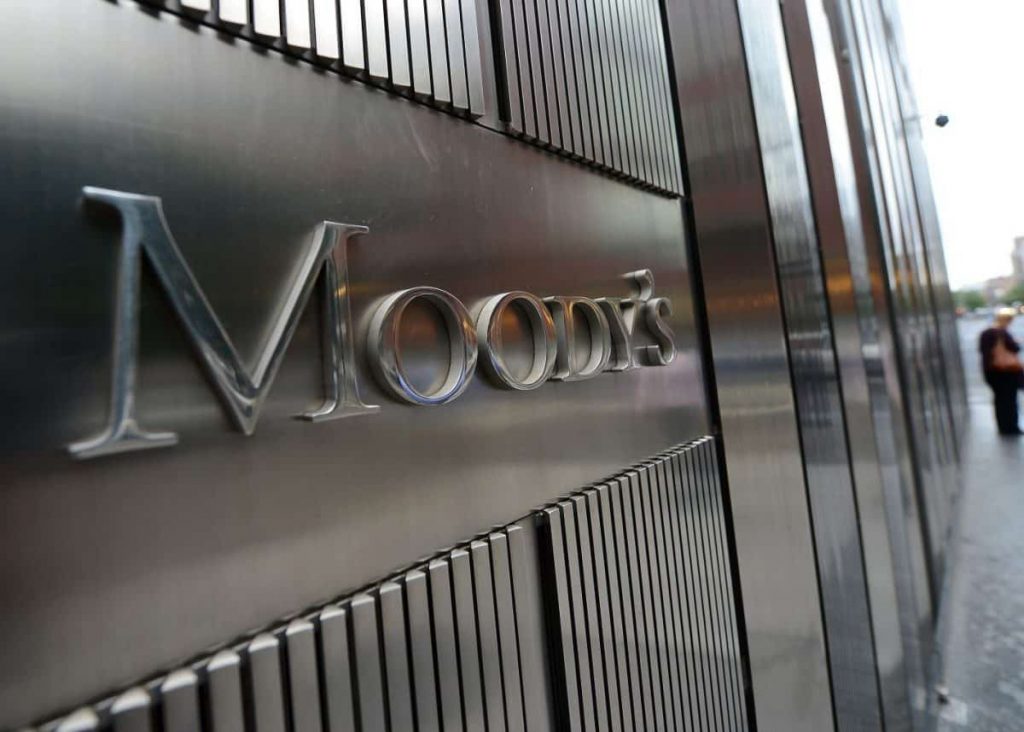Budget 2020: Moody’s downgrade hinges on fiscal consolidation


A sign for Moody's rating agency in front of the company headquarters in New York. Photo: Emmanuel Dunand / AFP
According to the mood in South Africa right now, if you believe in the Tooth Fairy, the Easter Bunny and Father Christmas, then you probably also think that Moody’s will not downgrade the country’s sovereign credit rating when it makes its next pronouncement in March 2020.
Perhaps this means that Mike van der Westhuizen, portfolio manager at wealth manager Citadel, is a true believer in the trio of all-time children’s favourites. Because he’s of the opinion that the seemingly forthcoming downgrade can be averted if the finance minister is able to show just enough fiscal consolidation.
But there is a spoiler alert: He believes this will only be a temporary delay and, irrespective of what Tito Mboweni says in his Budget Speech to Parliament on 26 February, the Moody’s downgrade will hit us in late-2020, probably after the next Mid-Term Budget Policy Statement (MTBPS).
Moody’s felt it was too early to judge reforms in January
“On 28 January 2020, Moody’s Investors Service analysts noted that it was ‘a bit early’ to judge the impact of both policy and structural reforms. Lucie Villa, Moody’s lead sovereign analyst for South Africa, told Bloomberg that while the data was not pointing to either a particularly positive or negative direction, ‘there is nothing really to flag for the time being’,” Van der Westhuizen observed.
“Certainly, everyone expects this Budget to be poor, but [the government] might manage to demonstrate the will to cut expenditure and show just enough fiscal consolidation and, in that case, Moody’s might delay any decision until November.”
The urgent need is to rein in the budget deficit
Van der Westhuizen said the main thing to look at, given that the Moody’s vultures are circling, is the need to rein in the budget deficit, which is starting to get even more out of control.
He explained that in the 2019 MTBPS, the Treasury had projected the consolidated budget deficit at 5.9% of GDP, averaging 6.2% of GDP over the next three years.
“A low growth, low inflation environment also affects the debt-to-GDP trajectory, the sustainability of which Mboweni has already warned about. As a proportion of South Africa’s GDP, the MTBPS notes a hike in gross debt from 56.7% in 2018-19, to 60.8% in 2020-2021 and 71.3% in 2022-23 if the status quo does not change, something the ratings agencies are understandably concerned about,” Van der Westhuizen noted.
Too many stakeholders not cooperating with Treasury
“These numbers show that the previous goal of fiscal consolidation is currently not going according to plan. Although it must be said that, while Treasury appears to be doing everything in its power to stop the slow bleed, it’s coming down to a cooperation issue with the rest of government and other influential stakeholders.”
Van der Westhuizen said he believed the disconnect between what needs to happen, and the disinclination within government to act, is likely to come through when Mboweni’s National Budget is revealed.







